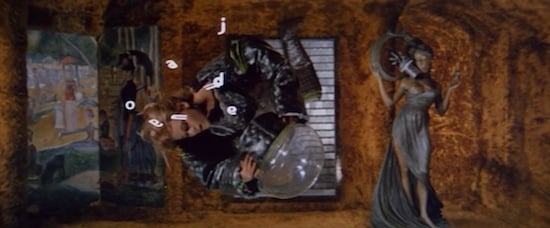Shocking Blocking (37)
By:
September 24, 2012

Critics love to hate Roger Vadim’s cartoonish sci-fi movie Barbarella, and I’m not going to argue with them — although (like the makers of The Fifth Element) I do enjoy and admire it. I just want to say a few words in praise of the zero-gravity shag-pile strip-tease cockpit title sequence, particularly the moment when Barbarella (Jane Fonda) removes her space helmet, releasing not only her luxurious locks but the letters of the actress’s name. This eye-popping blocking — an effect created by building a section of the cockpit on its side, so that the camera could peep up (down? Outer space is confusing!) at Fonda squirming around on a sheet of glass — speaks volumes about 1968, the midpoint and apex of the Sixties (1964–1973). Barbarella appeared just after the sexual liberation movement’s triumph, and just before second-wave feminists argued persuasively that sexiness restricts women to second-class citizenship. In its silly way, this is a movie about female sexual power — the parameters of which, this scene’s blocking suggests, can be neither confined nor defined… because there’s always something new to learn, always new territory to explore. Barbarella is not a feminist movie — but is it, therefore, a sexist movie? I don’t think so, but I’m not sure. Which is one of the reasons it’s so fun to watch.
An occasional series analyzing some of the author’s favorite moments in the positioning or movement of actors in a movie.
THIRTIES (1934–1943): It Happened One Night (1934) | The Man Who Knew Too Much (1934) | The Guv’nor (1935) | The 39 Steps (1935) | Young and Innocent (1937) | The Lady Vanishes (1938) | Mr. Smith Goes to Washington (1939) | The Big Sleep (1939) | The Little Princess (1939) | Gone With the Wind (1939) | His Girl Friday (1940)
FORTIES (1944–1953): The Diary of a Chambermaid (1946) | The Asphalt Jungle (1950) | The African Queen (1951)
FIFTIES (1954–1963): A Bucket of Blood (1959) | Beach Party (1963)
SIXTIES (1964–1973): For Those Who Think Young (1964) | Thunderball (1965) | Clambake (1967) | Bonnie and Clyde (1967) | Madigan (1968) | Wild in the Streets (1968) | Barbarella (1968) | Harold and Maude (1971) | The Mack (1973) | The Long Goodbye (1973)
SEVENTIES (1974–1983): Les Valseuses (1974) | Eraserhead (1976) | The Bad News Bears (1976) | Breaking Away (1979) | Rock’n’Roll High School (1979) | Escape from Alcatraz (1979) | Apocalypse Now (1979) | Caddyshack (1980) | Stripes (1981) | Blade Runner (1982) | Tender Mercies (1983) | Monty Python’s The Meaning of Life (1983)
EIGHTIES (1984–1993): Repo Man (1984) | Buckaroo Banzai (1984) | Raising Arizona (1987) | RoboCop (1987) | Goodfellas (1990) | Candyman (1992) | Dazed and Confused (1993) |
NINETIES (1994–2003): Pulp Fiction (1994) | The Fifth Element (1997)
OUGHTS (2004–13): Nacho Libre (2006) | District 9 (2009)
Joshua Glenn’s books include UNBORED: THE ESSENTIAL FIELD GUIDE TO SERIOUS FUN (with Elizabeth Foy Larsen); and SIGNIFICANT OBJECTS: 100 EXTRAORDINARY STORIES ABOUT ORDINARY THINGS (with Rob Walker).
